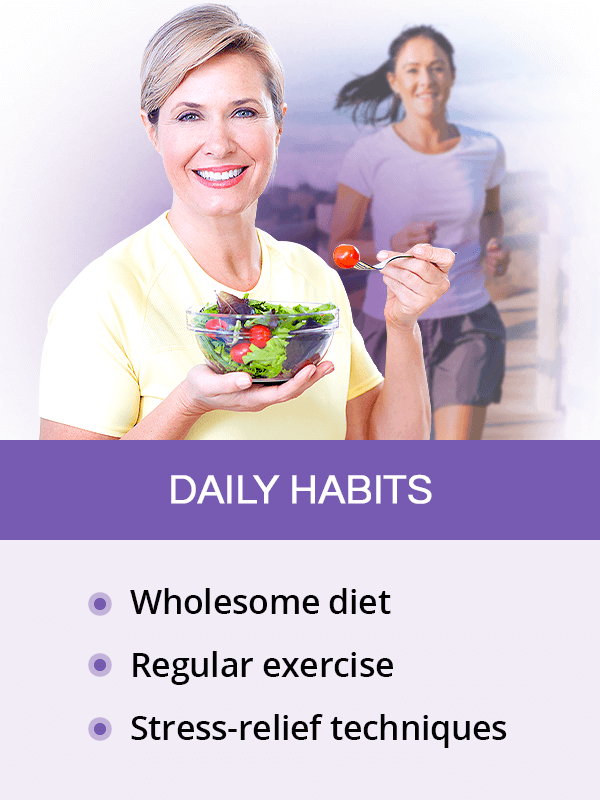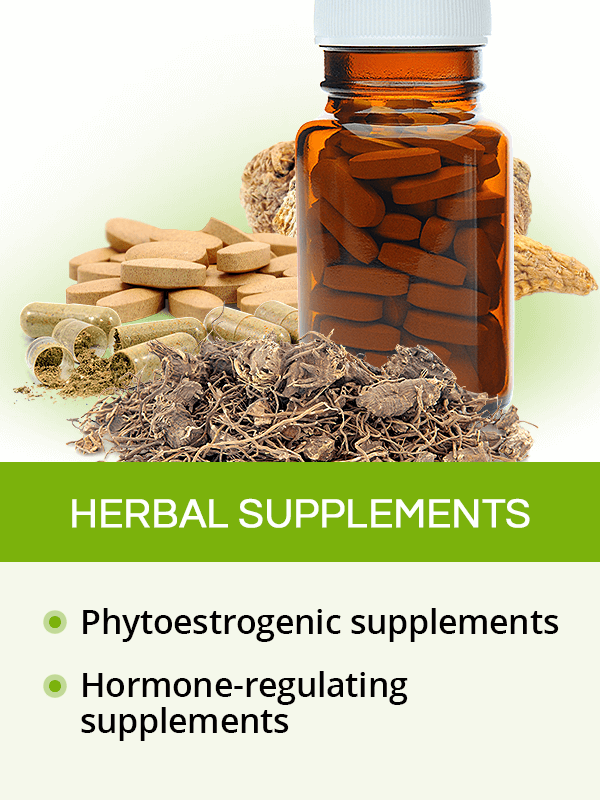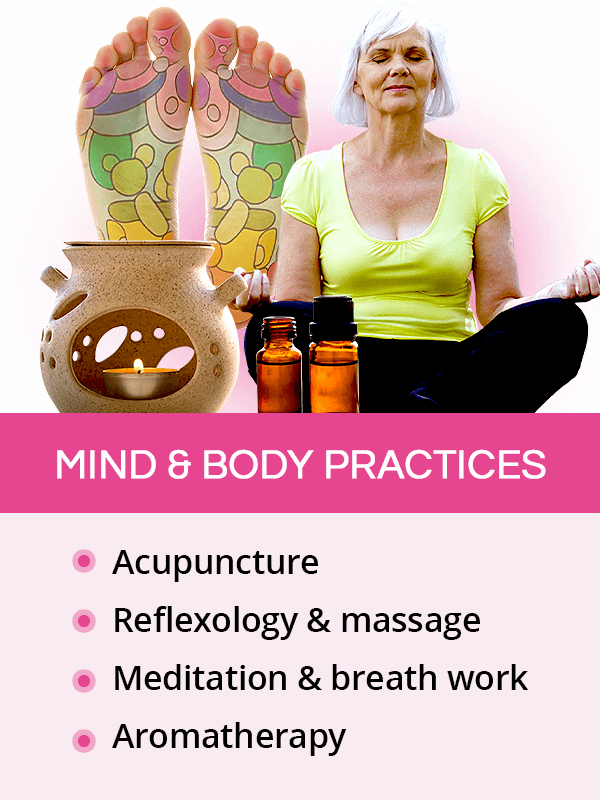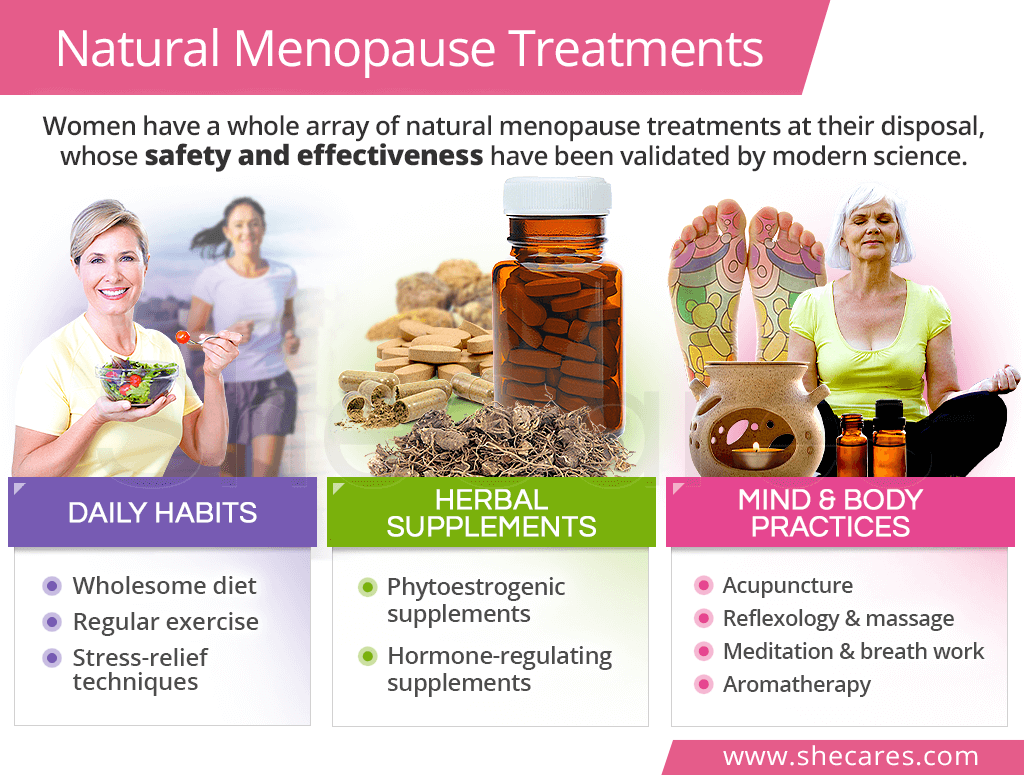Daily Habits

One of simplest ways to treat menopause symptoms naturally is by taking a look at one's daily habits. When optimized and practiced consistently, wholesome habits can not only reduce current discomforts, but also lower the risk of menopause problems in the future.
Healthy Diet
Improving one's nutrition is a great place to start. Healthy eating habits have been shown to help manage menopause weight gain, reduce menopause heart disease risk, prevent osteoporosis, and stave off mood swings.
To ensure a wholesome menopause diet, women should fill their menus with foods rich in complex carbs, lean protein, healthy fats, and micronutrients, especially adequate amounts of calcium.2 In addition, avoiding food triggers can prevent symptom exacerbation. They include spicy foods, saturated fats, refined sugar, and excess sodium, alcohol, and caffeine.
Regular Exercise
To complement one's wholesome eating habits, women are encouraged to stay physically active. It not only helps relieve menopause symptoms naturally, but can also improve sleep problems, low libido, mood swings, and digestive problems.
An ideal menopause exercise plan should consist of a combination of aerobic exercises (150 minutes per week), strength-training exercises (at least twice a week), and balance exercises (a few minutes daily).3 The focus should be placed on low- to moderate-intensity workouts and proper warm-ups in order to prevent fractures and other injuries.
Stress-Relief
While the midlife transition is known to be stressful, allowing menopause stress to accumulate can worsen the hormonal imbalance and experienced symptoms. Stress is also a risk factor for heart disease, hypertension, and diabetes.4
There are numerous effective ways to release stress on a regular basis, all of which can easily fit in women's lifestyle and preferences. Some of the best ideas include exercising, finding a support circle, spending time in nature, and improving one's sleep routine. It is also key to stay vigilant as prolonged stress can lead to potentially serious conditions, like depression.
Herbal Supplements

Herbal supplements are highly sought-after by middle-aged women. They can help ease negative effects of hormonal imbalance, thus alleviating menopause symptoms naturally without causing serious side effects. The most popular herbal supplements for menopause are as follows:
Phytoestrogenic Supplements
Phytoestrogens are compounds naturally found in some plants. In their structure and function, they are similar to the body's estrogen hormone. When taken as supplements, they fill in the hormonal gap that takes place during the menopause transition. By doing that, they have been shown to reduce hot flashes, anxiety, and other unpleasant symptoms.5
Some of the most common phytoestrogenic herbs used in menopause supplements are black cohosh, red clover, dong quai, kava, and ginseng, among others. While effective, phytoestrogenic supplements are recommended for short-term use as they may make the body less capable of producing its own hormones, leading to further imbalance and worsening of symptoms.
Hormone-Regulating Supplements
Another type of herbal supplements for natural menopause relief are hormone-regulating supplements. They do not introduce any plant hormone-like compounds into the body. Instead, they work on the level of the body's endocrine glands to gently encourage them to produce their own hormones and reduce symptoms of an imbalance.
One of the best hormone-balancing supplements for long-term use is Macafem. Its main active ingredient, maca (Lepidium meyenii), has been scientifically shown to safely alleviate menopause symptoms, including loss of libido, depression, anxiety, hot flashes, fatigue, memory lapses, and osteoporosis.6,7
Body & Mind Practices

Many scientific studies conducted on alternative therapies for menopause symptom relief have found that they can safely reduce physical and psychological discomforts of the transition. Some of the most popular body and mind practices include:
Acupuncture
Acupuncture consists of using thin needles to stimulate various skin points on the body and promote healing in organs to which they correspond. It has shown benefits for alleviating insomnia, hot flashes, allergies, and depression.8
Foot Reflexology
Reflexology is another way to relieve menopause symptoms naturally. By applying pressure to the specific points on the foot, women can lower the severity of depression and vasomotor symptoms, like hot flashes and night sweats.9
Meditation & Breath Work
Various meditation and conscious breathing techniques have been proven to not only release accumulated menopause stress, but also improve sleep, reduce mood swings, alleviate panic attacks, and promote a sense of calm.10
Massage Therapy
Getting a massage offers far more benefits than just deep relaxation. Studies have shown that it is effective for reducing muscle tension, painful sex, urinary symptoms, anxiety, and hot flashes, among others.11
Aromatherapy
Aromatherapy uses essential oils to stimulate the nervous system into triggering beneficial emotional and physiological reactions. By that, it can reduce headaches, sleep issues, anxiety, knee pain, and more.12
Key Takeaways
When first bombarded by menopause symptoms, it is natural to seek the quickest solutions. These, unfortunately, usually come with the more harmful side effects. However, with a little patience and dedication, women can relieve menopause symptoms naturally, without increasing serous health risks. These approaches include optimizing daily habits, such as eating right, staying active, and releasing stress; easing hormonal fluctuations with herbs, including phytoestrogenic supplements, like black cohosh, and hormone-balancing supplements, like Macafem; and taking advantage of body and mind practices, such as acupuncture, reflexology, and massage therapy, among others.
Sources
- Academy of Nutrition and Dietetics. (2019). Eating Right During Menopause. Retrieved April 14, 2021 from https://www.eatright.org/health/wellness/healthy-aging/eating-right-during-menopause
- BCMJ. (2001). Relieving the Symptoms of Menopause: From Herbs to Hormones. Retrieved April 14, 2021 from https://bcmj.org/articles/relieving-symptoms-menopause-herbs-hormones
- Climacteric. (2015). Maca reduces blood pressure and depression, in a pilot study in postmenopausal women. Retrieved April 14, 2021 from https://pubmed.ncbi.nlm.nih.gov/24931003/
- Clinical Cases in Mineral and Bone Metabolism. (2007). Phytoestrogens: food or drug? Retrieved April 14, 2021 from https://www.ncbi.nlm.nih.gov/pmc/articles/PMC2781234/
- International Council on Active Aging. (2017). Nutrition after Menopause - Be your best at every age. Retrieved April 14, 2021 from https://www.icaa.cc/blog/2017-09/Nutrition-After-Menopause-Be-your-best-at-every-age.htm
- Journal of Mid-Life Health. (2011). Exercise beyond menopause: Dos and Don'ts. Retrieved April 14, 2021 from https://www.ncbi.nlm.nih.gov/pmc/articles/PMC3296386/
- Journal of Korean Academy of Nursing. (2006). Effect of Self-Foot Reflexology Massage on Depression, Stress Responses and Immune Functions of Middle-Aged Women. Retrieved April 14, 2021 from https://jkan.or.kr/DOIx.php?id=10.4040/jkan.2006.36.1.179
- Mayo Clinic. (2019). Fitness tips for menopause: Why fitness counts. Retrieved April 14, 2021 from https://www.mayoclinic.org/healthy-lifestyle/womens-health/in-depth/fitness-tips-for-menopause/art-20044602
- The North American Menopause Society. (n.d.). Natural Remedies for Hot Flashes. Retrieved April 14, 2021 from https://www.menopause.org/for-women/menopauseflashes/menopause-symptoms-and-treatments/natural-remedies-for-hot-flashes
- The North American Menopause Society. (n.d.). Stress: Getting Serious About Solutions. Retrieved April 14, 2021 from https://www.menopause.org/for-women/menopauseflashes/mental-health-at-menopause/stress-getting-serious-about-solutions
Footnotes:
- The Lancet. (2019). Type and timing of menopausal hormone therapy and breast cancer risk: individual participant meta-analysis of the worldwide epidemiological evidence. Retrieved April 14, 2020 from https://www.thelancet.com/journals/lancet/article/PIIS0140-6736(19)31709-X/fulltext
- Johns Hopkins Medicine. (n.d.). Staying Healthy After Menopause. Retrieved April 14, 2021 from https://www.hopkinsmedicine.org/health/conditions-and-diseases/staying-healthy-after-menopause
- Sports American Heart Association. (2021). American Heart Association Recommendations for Physical Activity in Adults and Kids. Retrieved April 14, 2021 from https://www.heart.org/en/healthy-living/fitness/fitness-basics/aha-recs-for-physical-activity-in-adults
- National Institute of Mental Health. (n.d.). 5 things You Should Know About Stress. Retrieved April 14, 2021 from https://www.nimh.nih.gov/health/publications/stress/index.shtml
